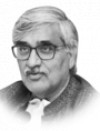https://arab.news/zaj9z
When the highest decision-making syndicate of one of Pakistan’s top higher education institutions, Quaid-e-Azam University (QAU), took the historic decision of reviving elected student unions in September, an old debate was rekindled. These politically partisan, outspoken student unions were prohibited through a series of martial law regulations in Pakistan some 30 years ago when General Zia ul Haq’s military government decided it would no longer tolerate the fiercely independent groups. After the election of the civilian government in 1988, many universities revived nominated students’ societies with limited freedom to advocate student causes but hardly any university reinstated elected student unions again.
At the heart of the reluctance to go for full fledged elected student unions was the fear that political parties’ proxy student organizations would make campuses political battle-grounds leading to violence and the disruption of academic peace.
Specifically Pakistan, but also countries in the region like India and Bangladesh in general have a long history of student activism and participation in political campaigns. Muslim students in undivided India had spearheaded the movement for the creation of Pakistan from 1940 onwards under the banner of Muslim Students’ Federation (MSF), and maintained close links with the All-India Muslim League (AIML), the mainstream political party of Indian Muslims at the time. This student activism continued after the creation of Pakistan when several other student organizations sprouted up, affiliated with different political ideologies and parties. Democratic Students Federation (DSF) was a mainly leftist organization with strong bases in Karachi, the nation’s capital at that time as well as Rawalpindi. Islami-Jamiat-e-Talaba (IJT), affiliated with the Islamist party Jamaat-e-Islami, was formed in 1948 and was able to establish its branches in almost all cities of Pakistan, including the erstwhile East Pakistan.
At the heart of the reluctance to go for full fledged elected student unions was the fear that political parties’ proxy student organizations would make campuses political battle-grounds leading to violence and the disruption of academic peace.
Ahmed Bilal Mehboob
These and some other organizations such as left-leaning National Students’ Federation (NSF) organized strong agitation against various governments especially the military governments of General Ayub Khan (1958-1969) and General Yahya Khan (1969-1971). In erstwhile East Pakistan, besides IJT, East Pakistan Muslim Students’ League, supported by Awami League, was politically very active which initially agitated against the Ayub regime and later played a key role in the separation of East Pakistan and the emergence of Bangladesh in 1971. During all this time, starting soon after the emergence of Pakistan in 1947, almost all universities and colleges had student unions which were regularly elected every year.
India also has a long-held tradition of elected student unions. The most recent high-profile election to Delhi University Students’ Union (DUSU) with more than 100,000 registered students eligible to vote, took place in September this year after a gap of three years due to the COVID-19 pandemic.
Another high-profile educational institution in Delhi, Jawaharlal Nehru University (JNU), is also known for its high-quality presidential debates ahead of elections. JNU was without an elected student union since 2019 due to pandemic and later, litigation. Student union elections in India are held under detailed guidelines.
Elected student unions are considered important for promoting democratic culture, the tolerance of opposite views and resolving differences through dialogue, organizational skills and leadership qualities in students. If QAU with its over 11,000 students is able to successfully organize the elections of its student union in the near future and no major violence or disruption is experienced, it will encourage the more than 200 public and private Pakistani universities to revive these unions on their campuses as well. Similar efforts in the past have not been very encouraging.
The only redeeming feature in the case of the QAU this time, is that the Chief Justice of Pakistan, Qazi Faez Isa, is a member of the QAU syndicate and the recent decision regarding the revival of elected student unions was reportedly taken with his strong support. It may not be possible for QAU to go back on its decision.
- The writer is the president of Pakistan-based think tank, PILDAT; Tweets at @ABMPildat; Youtube: @abmpildat
In Pakistan, the revival of student unions could transform political culture
 20
20
 1
13.11.2023
1
13.11.2023
https://arab.news/zaj9z
When the highest decision-making syndicate of one of Pakistan’s top higher education institutions, Quaid-e-Azam University (QAU), took the historic decision of reviving elected student unions in September, an old debate was rekindled. These politically partisan, outspoken student unions were prohibited through a series of martial law regulations in Pakistan some 30 years ago when General Zia ul Haq’s military government decided it would no longer tolerate the fiercely independent groups. After the election of the civilian government in 1988, many universities revived nominated students’ societies with limited freedom to advocate student causes but hardly any university reinstated elected student unions again.
At the heart of the reluctance to go for full fledged elected student unions was the fear that political parties’ proxy student organizations would make campuses political battle-grounds leading to violence and the disruption of academic peace.
Specifically Pakistan, but also countries in the region like India and Bangladesh in general have a long history of student activism and participation in political........
© Arab News Pakistan
 visit website
visit website






















 Toi Staff
Toi Staff Gideon Levy
Gideon Levy Belen Fernandez
Belen Fernandez Andrew Mitrovica
Andrew Mitrovica Mort Laitner
Mort Laitner Nikkei Editorial
Nikkei Editorial Ali Fathollah-Nejad
Ali Fathollah-Nejad Rami G Khouri
Rami G Khouri
